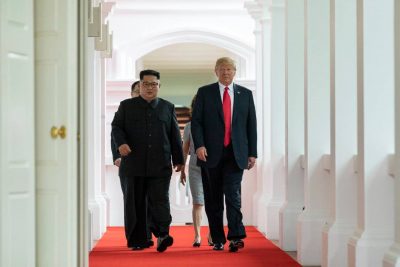Geo-strategic Conflicts Set to Intensify Following Trump-Kim Summit

Featured image: President Donald J. Trump and North Korean leader Kim Jong Un, walk together to their one-on-one bilateral meeting, Tuesday, June 12, 2018, at the Capella Hotel in Singapore. (Official White House Photo by Stephanie Chasez)
Tuesday’s Singapore summit between US President Donald Trump and North Korean Chairman Kim Jong-un has set the stage for the sharpening of disputes in the Asia-Pacific, particularly with China, despite the apparent relaxation of tensions.
During his press conference in Singapore, Trump mixed promises with veiled threats. He said crippling economic sanctions on North Korea would remain in place and there would be no reduction of the 32,000 US troops in South Korea—3,500 more than usually reported—notwithstanding his vague references to bringing the troops home.
Trump said
the US “will be stopping the war games (with South Korea), which will save us a tremendous amount of money, unless and until we see the future negotiation is not going along like it should.”
Like his other statements, this nebulous promise can be easily abrogated, should Pyongyang fail to toe Washington’s line.
The declaration apparently caught US allies by surprise. South Korea’s presidential spokesman Kim Eui-gyeom said:
“For now, there still is a need to find out the exact meaning and intention of President Trump’s remarks.”
South Korean President Moon Jae-in is scheduled to meet US Secretary of State Mike Pompeo in Seoul on Thursday to discuss the summit. Pompeo will then head to Beijing.
Japanese Defense Minister Itsunori Onodera opposed Trump’s proposal, saying:
“The US-South Korean exercises and US forces in South Korea play significant roles for the security of East Asia.”
The massive war games send a regular threatening message to China, which is the true target of US and Japanese aggression.
US Forces Korea seemed to be taken by surprise, saying:
“In coordination with our ROK [South Korean] partners, we will continue with our current military posture until we receive updated guidance from the Department of Defense and/or Indo-Pacific Command.”
China’s response gave a clearer indication of the developing conflict. A Tuesday op-ed in China’s state-owned Global Times insisted that if North Korea was no longer a “threat,” then “there will be no grounds for the US and South Korea to continue large-scale military drills and for Washington to maintain its military presence in South Korea.”
Foreign Ministry spokesman Geng Shuang stated:
“China has consistently held that sanctions are not the goal in themselves. The [United Nations] Security Council’s actions should support and conform to the efforts of current diplomatic talks towards denuclearizing the Korean Peninsula, and promote a political solution for the peninsula.”
China hopes to incorporate North Korea into its Belt and Road Initiative (BRI), an infrastructure plan to connect Asia with Europe and Africa. A Global Timesarticle on Wednesday called for China to “gradually shift to economic assistance” to Pyongyang in order to bring it into the BRI.
Washington is whipping up further tensions with Beijing. On May 27, the US sailed two naval vessels within the 12-nautical-mile zone around the Paracel Islands in the South China Sea, risking a clash with the Chinese navy. Trump’s emerging trade war with Beijing could likewise lead to military conflict.
Trump used the summit with Kim to deliver North Korea an ultimatum: join the United States in the growing war drive against China or become a casualty on the road to such a conflagration.
Amid the growing confrontation with China, the US Democratic Party and its allies have uttered their usual empty phrases about “human rights.” House Minority Leader Nancy Pelosi criticized Trump for “[elevating] North Korea to the level of the United States while preserving the regime’s status quo.”
The US media has largely denounced Trump for supposedly allowing China to emerge as the summit’s “winner.” Both the New York Times and Washington Post expressed anger at the apparent decision to cancel joint military exercises with South Korea.
The Times’ Nicholas Kristof, who regularly brays for imperialist war in the name of human rights, wrote an opinion piece, “Trump Was Outfoxed in Singapore.” He said:
“Trump has eased the tensions that he himself created when he threatened last fall to ‘totally destroy’ North Korea. I’m just not sure a leader should get credit for defusing a crisis that he himself created.”
For these layers, the US policies should continue to assert its hegemony in the Indo-Pacific region as aggressively as possible. They backed the Obama administration’s repudiation of the 2007 six-party agreement with Pyongyang, and its “pivot to Asia” to further militarize the region. They supported the decision to install a THAAD (Terminal High Altitude Area Defense) battery in South Korea, escalating tensions with North Korea and China, and the deployment of massive strategic weaponry to the Korean Peninsula, which threatened Pyongyang with total destruction.
The Washington Post denounced Trump for supposedly yielding US ground in the Asia-Pacific:
“With backing from China and Russia, which seek to diminish US strategic standing in Asia, North Korea has long sought an end to the exercises—and until Tuesday, this and previous US administrations had flatly rejected the idea.”
This campaign against Trump is not based on his domestic brutalization of immigrants, the destruction of entire societies in the Middle East, or the numerous other violations of democratic rights Washington has carried out. For this affluent layer, their primary concern is that Trump is not fully using the military against China and Russia, lamenting any let-up in US aggression.
Whatever their disagreements, Trump and the Republicans, as well as the Democrats and their allies, will continue the preparations for great power conflicts as laid out by the Pentagon in January’s National Defense Strategy, which branded China and Russia as threats to America’s post-World War II hegemony.

